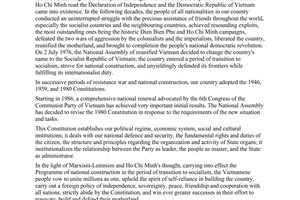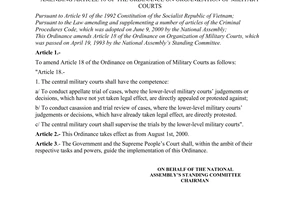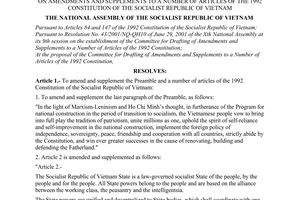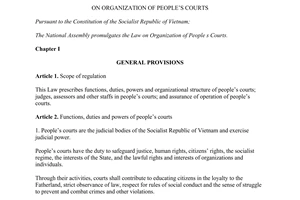Nội dung toàn văn Ordinance No.04/2002/PL-UBTVQH11 of November 04, 2002 on organization of The Military Courts
|
THE
STANDING COMMITTEE OF NATIONAL ASSEMBLY |
SOCIALIST
REPUBLIC OF VIET NAM |
|
Hanoi, November 04, 2002 |
ORDINANCE
ON ORGANIZATION OF THE MILITARY COURTS
(No. 04/2002/PL-UBTVQH11 of November 4, 2002)
Pursuant to the 1992 Constitution of the
Socialist Republic of Vietnam, which was amended and supplemented under
Resolution No. 51/2001/NQ-QH10 bổ sung điều của Hiến pháp nước cộng hoà xã hội chủ nghĩa Việt Nam năm 1992">51/2001/QH10 of December 25, 2001 of the Xth National Assembly,
the 10th session;
Pursuant to the Law on Organization of the People’s Courts;
This Ordinance prescribes the organization and operation of the Military
Courts.
Chapter I
GENERAL PROVISIONS
Article 1.- The military courts are adjudicating bodies of the Socialist Republic of Vietnam, which belong to the system of people’s courts organized in the Army.
Within the scope of their functions, the military courts are tasked to protect the socialist legislation; to protect the socialist regime and the people’s mastery; to protect security and defense, discipline and combat strength of the Army; to protect the property of the State and collectives; to protect the lives, health, assets, freedom, honor, dignity of army men, defense employees and workers as well as of other citizens.
Through their activities, the military courts contribute to educating army men, defense employees and workers to be loyal to the Fatherland, to strictly abide by laws and the Army’s regulations, observe the rules of social life and to raise the sense of struggle to prevent and combat crimes as well as other law offenses.
Article 2.-
1. The military courts include:
a) The Central Military Court;
b) The military courts of the military zone and the equivalent level;
c) The regional military courts.
2. Basing itself on the tasks and organization of the Army, the National Assembly Standing committee shall decide to set up or dissolve the military courts of the military zone and the equivalent level, and/or the regional military courts at the proposal of the chief judge of the Supreme People’s Court after reaching agreement with the Minister of Defense.
Article 3.- The military courts are competent to adjudicate criminal cases in which the defendants are:
1. Army men on active service, defense employees or workers, reserve army men being in the period of concentrated training or combat readiness inspection; militia or self-defense personnel detached to the Army for combat or combat services and persons summoned for military tasks and directly managed by army units.
2. The persons other than the subjects prescribed in Clause 1 of this Article, who commit offenses related to military secrets or causing damage to the Army.
Article 4.- For persons who are no longer in the Army but detected as having committed criminal acts while they were on active service in the Army or persons who are being on active service in the Army but detected as having committed criminal acts before they join the Army, the military courts shall adjudicate offenses related to military secrets or causing damage to the Army; other offenses shall be adjudicated by people’s courts.
Article 5.- Where a case involves defendants or criminals who are under the adjudicating jurisdiction of military courts and defendants or criminals who are under the adjudicating jurisdiction of people’s courts, the adjudicating jurisdiction shall be exercised as follows:
1. Where the case can be separated, the military court shall try the defendants and criminals prescribed at Clause 1, Article 3 and Article 4 of this Ordinance; the other defendants and criminals shall be under the adjudicating jurisdiction of the people�s courts;
2. Where the case cannot be separated, the military court shall adjudicate the entire case.
Article 6.- The regime of judge appointment shall apply to the military courts.
The regime of designation of army men’s jurors shall apply to the military courts of the military zone and equivalent level as well as the regional military courts.
Article 7.- The adjudication by the military courts of the military zone and equivalent level, and the regional military courts shall be participated by army men’s jurors as provided for by the procedural legislation. In adjudication, the army men’s jurors are equal in rights with the judges.
Article 8.- When conducting trials, judges and army men’s jurors are independent and only abide by laws.
Article 9.- The military courts conduct trials collectively and make decisions by majority. The composition of the Board of Juries at each adjudicating level shall be prescribed by the procedural legislation.
Article 10.- The military courts shall conduct trials publicly, except for cases of necessity to conduct trials behind closed doors to protect State secrets, military secrets, fine traditions and customs of the nation or to keep secrets of the involved parties at their legitimate requests.
Article 11.- The military courts shall conduct trials on the principle that all citizens are equal before law, regardless of sex, nationality, religion, social status, social position, and that individuals, agencies, organizations, people’s armed force units and production and/or business establishments of all economic sectors are all equal before law.
Article 12.- The military courts ensure the right to defense of defendants and the right to protect legitimate rights and interests of the involved parties.
Article 13.- The military courts ensure the right of people involved in legal proceedings to use the speech and scripts of their respective nationalities before court.
Article 14.-
1. The military courts follow the regime of two-level adjudication.
The first-instance judgements and/or decisions of military courts can be protested against or appealed under the provisions of the procedural legislation.
The first-instance judgements and/or decisions, which are not protested against or appealed within the law-prescribed time limit shall take legal effect. For protested or appealed judgements or decisions, the cases shall be brought to appellate trials. The appellate judgements or decisions shall take legal effect.
2. For judgements and decisions of military courts, which have already taken legal effect but are detected as having violated laws or contained new circumstances, they shall be reviewed according to the supervisory or review order prescribed by procedural legislation.
Article 15.- The military courts’ judgements and decisions, which have already taken legal effect, must be respected by people’s armed force units, State bodies, political organizations, socio-political organizations, social organizations, socio-professional organizations, economic organizations and everyone.
Individuals, units, agencies and organizations, that are obliged to execute the judgments and/or decisions of military courts, must strictly execute them.
Within their respective functions, agencies and organizations, which are tasked to enforce judgments and/or decisions of military courts, must strictly enforce them and take responsibility before law for the performance of such task.
Article 16.- In case of necessity, together with the judgments and decisions they have made, the military courts shall request the heads of the concerned people’s armed force units, agencies or organizations to apply measures to overcome the causes of and conditions for commission of crimes or law offenses in their respective units, agencies and organizations. Upon receiving such requests, the heads of such units, agencies or organizations shall have to study the implementation thereof and within thirty days as from the date of receiving the requests have to notify the military courts thereof.
Article 17.- The military courts shall coordinate with people’s armed force units, agencies and organizations in bringing into full play the educative effect of court sessions and creating favorable conditions for the enforcement of judgments and decisions of the military courts.
Article 18.- The military courts shall, together with the military procuracies, the Army’s criminal investigation agencies, the Army’s security bodies and other concerned agencies, study and implement undertakings and measures to prevent and combat crimes as well as other law offenses.
Article 19.- The political offices of the military zone and equivalent level shall annually organize a conference of army men’s delegates in their respective units as well as units stationing in the localities to hear the military courts of the same level reporting on their activities and answer questions of delegates.
The military courts shall have to answer questions of People’s Council deputies about the military courts’ activities related to the localities.
Article 20.- The Supreme People’s Court shall organizationally manage the military courts in close coordination with the Ministry of Defense.
The regulations on the coordination between the Supreme People’s Court and the Ministry of Defense in the organizational management of the military courts shall be submitted by the chief judge of the Supreme People’s Court to the National Assembly Standing Committee for decision.
Chapter II
ORGANIZATION, TASKS AND POWERS OF MILITARY COURTS OF ALL LEVELS
Section I. THE CENTRAL MILITARY COURT
Article 21.-
1. The Central Military Court lies within the organizational structure of the Supreme People’s Court.
2. The Central Military Court is organizationally structured to include:
a) The Committee of Judges of the Central Military Court;
b) The appellate courts of the Central Military Court;
c) The assisting apparatus.
3. The Central Military Court consists of the chief judge, deputy-chief judges, judges, clerks.
Article 22.-
1. The Central Military Court has powers to conduct:
a) Appellate trials of criminal cases where judgments and/or decisions handed down by the immediate subordinate military courts have not yet taken legal effect but have been protested against and/or appealed under the provisions of the procedural legislation;
b) Supervisory and review trials of criminal cases where judgments and/or decisions handed down by subordinate military courts, which have already taken legal effect and been protested against under the provisions of the procedural legislation.
2. The Central Military Court shall supervise the trials by subordinate military courts.
Article 23.-
1. The Committee of Judges of the Central Military Court consists of:
a) The chief judge, deputy-chief judges of the Central Military Court;
b) A number of judges of the Central Military Court, who are decided by the chief judge of the Supreme People’s Court at the proposal of the chief judge of the Central Military Court.
The total number of members of the Committee of Judges of the Central Military Court shall not exceed seven.
2. The Committee of Judges of the Central Military Court have the following tasks and powers:
a) To guide in detail the uniform application of law at the military courts, based on the resolutions of the Council of Judges of the Supreme People’s Court.
b) To draw experiences from trials conducted by the military courts;
c) To adopt reports of the chief judge of the Central Military Court on activities of the military courts for further report thereon to the chief judge of the Supreme People’s Court and the Defense Minister.
3. A meeting of the Committee of Judges of the Central Military Court must be attended by at least two-thirds of the total number of its members. Decisions of the Committee of Judges of the Central Military Court must be approved through voting by more than half of the total number of its members.
Article 24.-
1. The chief judge of the Central Military Court has the following tasks and powers:
a) To organize the adjudicating work;
b) To chair meetings of the Committee of Judges of the Central Military Court;
c) To protest according to supervisory procedures against judgments and decisions, which have been handed down by the subordinate military courts and have already taken legal effect, under the provisions of the procedural legislation;
d) To organize professional fostering for judges, army men’s jurors and officials of the military courts;
e) To organize the inspection of activities of the subordinate military courts;
f) To report on the military courts’ activities to the chief judge of the Supreme People’s Court and the Defense Minister;
g) To carry out other activities as provided for by law.
2. The deputy-chief judges of the Central Military Court shall assist the chief judge, performing tasks assigned by the chief judge. When the chief judge is absent, a deputy-chief judge shall be authorized by the chief judge to lead Court’s work on the latter�s behalf. The deputy- chief judges take responsibility before the chief judge for their assigned tasks.
Section 2. MILITARY COURTS OF MILITARY ZONE AND EQUIVALENT LEVEL
Article 25.-
1. A military-zone or equivalent-level military court is organizationally structured to include:
a) The Judges’ Committee;
b) The assisting apparatus.
2. A military-zone or equivalent-level military court consists of the chief judge, deputy-chief judges, judges, army men’s jurors and clerks
Article 26.- The military courts of the military zone or equivalent level are competent to conduct:
1. First-instance trials of criminal cases not falling under the jurisdiction of the regional military courts and criminal cases which fall under the jurisdiction of the regional military courts but are brought up by the military courts of the military zone or equivalent level for trials;
2. The appellate trials of criminal cases where the judgments or decisions of subordinate military courts have not yet taken legal effect but have been protested against or appealed under the provisions of procedural legislation.
3. The supervisory and review trials of criminal cases where the judgments or decisions of subordinate military courts have been protested against under the provisions of the procedural legislation;
4. The settlement of other matters prescribed by law.
Article 27.-
1. The Committee of Judges of a military-zone or equivalent-level military court consists of:
a) The chief judge and deputy-chief judges of the military-zone or equivalent-level military court;
b) A number of judges of the military-zone or equivalent-level military court, decided by the chief judge of the Central Military Court at the proposal of the chief judge of the military-zone or equivalent-level military court.
The total number of members of the Committee of Judges of a military court of the military zone or equivalent level shall not exceed five.
2. The Committee of the military-zone or equivalent-level military court has the following tasks and powers:
a) To conduct supervisory and review trials of criminal cases where the judgments or decisions of the subordinate military courts are protested against under the provisions of the procedural legislation;
b) To ensure the uniform application of laws at their military courts and the subordinate military courts;
c) To draw adjudicating experiences;
d) To adopt reports of the chief judges of the military-zone or equivalent level military courts on activities of the military courts in the military zones or the equivalent for further report to the chief judge of the Central Military Court, the commanders of the military zones or the equivalent.
3. A meeting of the Committee of Judges of the military-zone or equivalent-level military court must be attended by at least two-thirds of the total number of its members. Decisions of the Committee of Judges of the military-zone or equivalent-level military court must be approved through voting by more than half of its members.
Article 28.-
1. The chief judges of the military-zone or equivalent- level military courts shall have the following tasks and powers:
a) To organize the adjudicating work;
b) To chair meetings of the Committees of Judges of the military-zone or equivalent-level military courts;
c) To protest according to the supervisory procedures against judgments or decisions of subordinate military courts, which have already taken legal effect, according to the provisions of the procedural legislation;
d) To organize the inspection of activities of the subordinate military courts;
e) To organize professional fostering for judges, army men’s jurors and officials of their military courts as well as the subordinate military courts;
f) To report on activities of the military courts in the military zones or the equivalent to the chief judge of the Central Military Court, the military-zone or equivalent-level commanders;
g) To perform other work as prescribed by law.
2. The deputy-chief judges shall assist the chief judge, performing tasks assigned by the chief judge. When the chief judge is absent, a deputy-chief judge shall be authorized by the chief judge to lead the court’s work on the latter’s behalf. The deputy-chief judges take responsibility before the chief judge for their assigned tasks.
Section 3. REGIONAL MILITARY COURTS
Article 29.-
1. A regional military court consists of the chief judge, deputy-chief judges, judges, army men’s jurors and clerks.
It has an assisting apparatus.
2. The regional military courts have competence to conduct first-instance trials of criminal cases regarding crimes prescribed in the Penal Code, where the defendants are of lieutenant colonel or lower ranks or hold the post of commander of regiment, equivalent or lower level; to settle other matters as prescribed by law.
Article 30.-
1. The chief judges of the regional military courts have the following tasks and powers:
a) To organize the adjudicating work;
b) To report on activities of their regional military courts to the chief judges of their immediate superior military courts;
c) To perform other work as prescribed by law.
2. The deputy-chief judges shall assist the chief judge, performing the tasks assigned by the chief judge and take responsibility before the chief judge for their assigned tasks.
Chapter III
JUDGES AND ARMY MEN’S JURORS
Article 31.-
1. Army officers who are on active service and satisfy the conditions prescribed by the Ordinance on Judges and Jurors of the People’s Courts may be selected and appointed to be judges of regional military courts or judges of military zone- level military courts or judges of the Central Military Court.
2. Army men on active service, defense employees or workers, who satisfy the conditions prescribed by the Ordinance on Judges and Jurors of the People’s Courts may be designated to be army men’s jurors of regional military courts or army men’s jurors of the military-zone or equivalent-level military courts.
Article 32.- The procedures for selection, appointment, removal from office and dismissal of judges; the procedures for designation, removal from office and dismissal of army men’s jurors; the rights and obligations of judges, army men’s jurors; the terms of office of judges and army men’s jurors of the military courts of each level shall comply with the provisions of the Ordinance on Judges and Jurors of the People’s Courts.
Article 33.- Judges and army men’s jurors shall take responsibility before law for the performance of their tasks and the exercise of their powers and must keep their work secrets as provided for by law; if committing acts of law violation, they shall, depending on the nature and seriousness of their violations, be disciplined or examined for penal liability under the provisions of law.
Article 34.- If judges and/or army men’s jurors cause damage while performing their tasks or exercising their powers, the courts where they perform the adjudicating tasks shall have to pay the compensations therefor, then the judges and/or army men’ jurors, who have caused the damage, shall have to make the reimbursements to the military courts according to the provisions of law.
Article 35.-
1. The chief judge, the deputy-chief judges of the Central Military Court shall be appointed, removed from office and dismissed by the State President.
2. The chief judges and the deputy-chief judges of the military-zone or equivalent-level military courts shall be appointed, removed from office and dismissed by the chief judge of the Supreme People’s Court after reaching agreement with the Defense Minister.
3. The terms of office of the chief judges and deputy-chief judges of the military courts of all level shall be five years, counting from the dates they are appointed.
Article 36.- The chief judge of the Central Military Court is a deputy- chief judge of the Supreme People’s Court.
The judges of the Central Military Court are judges of the Supreme People’s Court.
Article 37.- The number of judges of the military courts of each level; the numbers of the army men’s jurors of the military-zone or equivalent-level military courts and the regional military courts shall be decided by the National Assembly Standing Committee at the proposal of the chief judge of the Supreme People’s Court after reaching agreement with the Defense Minister.
Chapter IV
ENSURING THE OPERATION OF MILITARY COURTS
Article 38.-
1. The total payroll of the Central Military Court, the military-zone or equivalent-level military courts and the regional military courts shall be decided by the National Assembly Standing Committee at the proposal of the chief judge of the Supreme People’s Court after reaching agreement with the Defense Minister.
2. The chief judge of the Supreme People’s Court shall closely coordinate with the Defense Minister in prescribing the payroll for each military-zone or equivalent-level military court and each regional military court.
Article 39.- In order to ensure the performance of their functions and tasks by military courts, the Defense Minister shall decide:
1. To transfer judges from one military court to another for the performance of tasks after reaching agreement with the chief judge of the Supreme People’s Court;
2. To dispatch judges from one military court to another of the same level for the performance of tasks within a given time limit.
Article 40.- The assisting apparatuses of the Central Military Court, the military-zone or equivalent-level military courts and the regional military courts shall be prescribed by the chief judge of the Supreme People’s Court after reaching agreement with the Defense Minister and be submitted to the National Assembly Standing Committee for approval.
Article 41.-
1. Army men, defense employees and workers working at military courts shall have the rights and obligations according to the Army’s regulations; and enjoy the allowance regime applicable to the court sector.
The military courts’ judges shall enjoy the preferential regime as prescribed for judges in the Ordinance on Judges and Jurors of the People’s Courts.
2. The uniforms, the identify cards of army men, military employees and workers working at military courts shall be prescribed by the National Assembly Standing Committee.
Article 42.-
1. The funding for operation of the military courts shall be estimated by the Ministry of Defense in coordination with the Supreme People’s Court, which shall request the Government to submit to the National Assembly for decision.
2. The management, allocation and use of the funding shall comply with the legislation on the State budget.
3. The State shall give priority to the investment in the development of information technology as well as other facilities to ensure that the military courts well fulfill their functions and tasks.
Article 43.- The Army guards are tasked to guard against defendants and escort them to court sessions, protect court sessions and work places of the military courts.
Chapter V
IMPLEMENTATION PROVISIONS
Article 44.- This Ordinance takes effect as from November 15, 2002. It replaces the April 19, 1993 Ordinance on Organization of the Military Courts.
The previous provisions contrary to this Ordinance are all hereby annulled.
Article 45.- The Government, the Supreme People’s Court shall, within the scope of their functions and tasks, have to guide the implementation of this Ordinance.
|
ON BEHALF OF THE NATIONAL
ASSEMBLY STANDING COMMITTEE |





